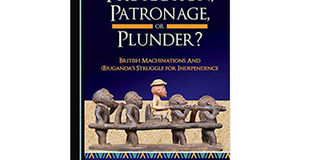Book review: A trove of colonial interests and everything in between

As soon as you see this mouthful of title “Protection, Patronage, or Plunder? Imperial Machinations and (B)uganda’s Struggle for Independence”, your prejudiced mind is likely to draw conclusions that it was written by some neo-traditionalist Kabaka Yekka type.
Then, when you see who the author is—Apollo N. Makubuya—your fears are seemingly confirmed and so you throw up your arms to exclaim, “I knew it!”
After all, Mr Makubuya is the Chief Palace Advisor to the Kabaka of Buganda—Ronald Muwenda Mutebi II—and has previously served as Buganda’s Third Deputy Prime Minister, Minister of Justice and Constitutional Affairs and Attorney General.
However, I would advise you to drop your biases as this book is more of an academic aria as opposed to being some lame attempt at ethnic evangelism.
The book’s rather dispassionate and detached premise states that British Imperialism in Africa, as it were, was founded and sustained on three legs of the colonial stool. Namely: the plunder of resources; the protection of British interests; and a system of patronage under which Britain spread its prestige and influence through, ultimately, unjust means.
Sure, these three legs stand for much the same thing. However, Makubuya’s rendering of this oft-shared hypothesis is unique in many ways.
That’s because where one would expect the author’s own sense of outrage to devalue the purchase of his arguments, Mr Makubuya remains painstakingly magisterial in his analysis.
You shall find many interesting illuminations here about the kings of Buganda, the British and Ugandan leaders in the colonial and post-colonial era.
Speaking of the latter, I was amused to read about Idi Amin’s 1973 “Save Britain Charity Fund” in which he offered then conservative British Prime Minister Edward Heath foreign aid from Uganda to Britain.
“The rapidly deteriorating economic situation in Britain, which is the most senior member of the Commonwealth, is a shame and great embarrassment not only to Britain, but also to other members of the Commonwealth,” President Amin said to Heath via telegram.
Conversely, in the twilight of Amin’s regime, the British propped him up through the informal help to his (Amin’s) lethal army.
Using unscheduled Uganda Airlines flights to and from Stansted Airport, an international airport located near Stansted Mountfitchet, Essex, England, 42 mi northeast of Central London, Britain, in 1976, the British supplied the Uganda Army Shop to the tune of £70,000 a month. This is when much of the civilised world had turned its back on Amin.
A British parliamentarian told the House of Commons at the time: “It is well known that cargoes of whisky and brandy [aside from materiel] are flown out, most likely for the purpose of buying loyalty from Amin’s officers and perhaps to give them even less of a conscience when they go around committing genocide on Amin’s instructions … the fact that this is being exported from Britain is to our eternal shame.”
Then, still on the subject of Anglo-Ugandan relations in the post-colonial era, the author hints at President Museveni being a comprador (agent of foreign interests), even as a rebel.
When Museveni took power, the British High Commissioner, on the morning of January 26, 1986, called on their operatives “to make early contact with and seek NRA assistance in protecting the British community”. And to follow up on Gen Museveni’s promises to Maj Gen Commander A.J.G Pollard, the principal of the British Military Advisory Training Team, which was in Kampala, that he would preserve UK interests once he was at the helm.
Museveni didn’t disappoint.
The British High Commissioner then, Richard Posnett, reported that with Gen Museveni’s ascendancy, he helped protect UK interests and so they immediately gave him £1,100,000 as a military training package to “further British interests in East Africa.”
Set aside your reservations about what you think Mr Makubuya’s true intentions are and settle down to read this book. It will be a pleasant surprise and could be the perfect companion when you feel like learning more about your Pearly country.




